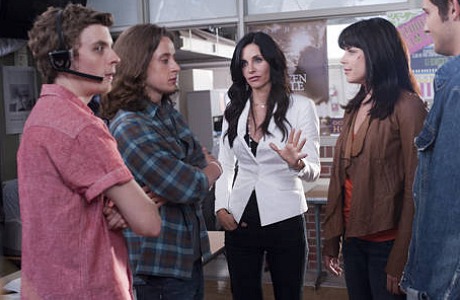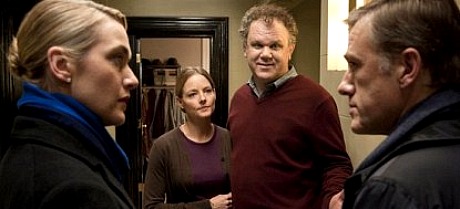What a pleasure to hear President Obama talk about blunt realpolitik conversations with reps of John Boehner and Paul Ryan without the usual measured, turn-the-other-cheek tonality that he always puts out during press conferences and official announcements. Eat it, suckah!
Restrepo Antidote?
During last year’s Cannes Film Festival I brilliantly managed to avoid seeing the winner of the Semaine de Critiques Grand Prix prize winner — Janus Metz‘s Armadillo, a Danish-produced Afghanistan war doc which Kino Lorber is opening today in New York. The trailer suggests something riveting and impressionistic , and the doc’s Rotten Tomatoes rating (88%) is tied for the highest of any film opening today.
The other 4.15 opener with an 88% rating is Janet Grillo‘s Fly Away.
I’m expecting an Armadillo screener to arrive tomorrow. I asked the Kino Lorber rep when Metz’s film might open in Los Angeles and other cities, but that’s apparently still being determined.
I half-admired and half-hated Sebastian Junger and Tim Hetherington‘s Restrepo, the last significant Afghanistan-war doc. Here’s my 6.20.10 slam piece in which I explained how Restrepo advances its pro-troops, pro-war-effort agenda by lying through omission. Here’s hoping that Armadillo provides a counter-balance.
Great Credits, Not-Great Films
With its 1.33 cropping and squawky Japanese-transistor-radio sound, this YouTube clip of the main-title sequence from Clive Donner‘s What’s New, Pussycat? feels a bit underwhelming. But it’s still one of the liveliest, bounciest and most vigorously designed main-title sequences ever thrown together for a ’60s film.
More to the point, for an anarchic, occasionally amusing but not-especially-good ’60s comedy. Because that’s the category we’re dealing with here — great opening credits followed by a letdown movie.
The only other two examples I can think of are the ’60s montage “The Times They Are A’Changin'” credits for Watchmen and Saul Bass’s legendary black-cat credit sequence for Walk on The Wild Side.
All-Time Best Credit Sequence
The 2006 Koch Lorber DVD of Lina Wertmuller‘s Seven Beauties looks fine, but this 1975 Italian-made classic should be upgraded to Bluray. I was ripped the first time I saw it, and I remember laughing helplessly during the opening credits…oh, yeah.
Hunger & Denial
Bertrand Tavernier‘s The Princess of Montpensier (IFC Films) opens today in theatres and 4.20 on demand. Here’s my 3.9 review: “The initial response at the 2010 Cannes Film Festival was not wildly enthusiastic, so I was rather surprised to find that this historical drama of intimacy, set in 16th Century France during the Catholic vs. Huguenot wars, is one of the most intriguing erotic trips I’ve taken in a long while.

“Partly because the occasionally undressed lead, Melanie Thierry, performs in a way that feels rather prim and Grace Kelly-ish, an all-but-extinct vibe or romantic brand in films today. But mostly because the movie is mostly about unrequited desire and hardly at all about consummation. It’s probably not bawdy or obvious enough for most viewers, but I felt and believed this film without the slightest discomfort, and I never wanted to turn it off or multitask as I watched.
“The story is basically about four or five guys who can think of little else but having Thierry, and who spend most of their screen time being told ‘if only,’ ‘no,’ ‘not now,’ ‘not here’ and so on. I only know that the combination of Thierry, the feeling of sensual restraint or suppression, and the generally realistic and non-movieish atmosphere created by Tavernier and his team (including some excellent hand-to-hand combat and duelling scenes) feels right and believable and on-the-money.
“It’s delightful when a film drops you into an exotic time-trip visitation without making this world seem arch or ‘performed’ or overly prettified or set-decorated within an inch of its life. I’ve never thought of Tavernier as a director who excels or even cares about violent action and/or mercury-popping eroticism, but maybe I need to go back to watch some of his films.
“I didn’t expect to say this, but I felt as stirred and satisfied and convinced by The Princess of Montpensier as I was by Andrzej Wajda‘s Danton (’83), a superb historical drama about the post-revolutionary “terror.”
Sleeping Beauty
Another Cannes 2011 trailer, this time posted from Vimeo by Awards Daily‘s Ryan Adams:
Sleeping Beauty from Pollen Digital on Vimeo.
We Have a Pope
Coped from a Rope of Silicon/Brad Brevet post.
Saved?
I missed the 4.12 announcement about Lindsay Lohan snagging the role of Victoria Gotti in a feature biopic about the latter’s late mobster dad. So Lilo isn’t doomed after all. If you have any compassion or charity in your heart you have to feel fairly good about this. Second chances don’t come along that often.
Flatliners
I’ve tried three times to write a Scream 4 review, but the K-Mart-level cynicism and detachment in this film is so dull and yet nauseating I couldn’t do it. I just couldn’t put words to screen. To think that these movies actually used to be about playing it half-straight and making people feel scared from time to time.

(l. to r.) Scream 4‘s Erik Knudsen, Rory Culkin, Courteney Cox and Neve Campbell.
I happened to watch part of Gore Verbinski‘s The Ring on TV the other day, and that is still very frightening at times. Scream 4 isn’t fit to kiss the ass of this film, much less the original Ringu.
I realize, of course, that that soullessness is critical to Scream 4‘s satiric (and yes, occasionally comedic) intent, but I couldn’t begin to even think about laughing, much less smirking. The actors are required to act like zombies in this thing and that’s what they actually seem to be — young soulless attitude ghouls with the ability to walk and talk and convey indifference to everyone and everything, especially those in the audience.
I too felt dead in my willingness to sit there and watch this shit. If Ghostface has jumped off the screen like Jeff Daniels in The Purple Rose of Cairo and tried to finish me off, I would have run like hell because I want to live another day, but any honest person who pays to see this thing would be obliged to say, “Aaah, fuck it, go ahead, I deserve it.”
Neve Campbell is a good actress who cares and tries and therefore deserves a pass, but I came out of this film despising the ground that Emma Roberts and Hayden Panettiere walk on; ditto Rory Culkin and Eric Knudsen.
65% of the critics have given Scream 4 a pass so far. How can they live with that much cynicism? How can they breathe?
Godless Carnage
So what happened to the original title of Yasmina Reza‘s God of Carnage play in its transition into a Roman Polanski film? Sony Classics announced this morning that they’ll be releasing Polanski’s Carnage, which costars Jodie Foster, John C. Reilly, Kate Winslet and Christoph Waltz, at the end of the year. But without explaining why they (or producer Said Ben Said) have dropped the words “God of.”

3:45 pm Update: A publicist for the film just told me that the decision to change the title “was made by the producer [Said Ben Said] and Polanski.” She also said she hadn’t been told why they made the title change, and that no additional information would be forthcoming. I also tried to get an answer directly from Sony Classics — zip.
One possible answer is that somebody in marketing is afraid that right-wing yahoos might be offended by a Roman Polanski movie that mixes the words “God” and “carnage.” This is belied, of course, by the fact that Reza’s play has been a huge coast-to-coast hit for the last two years with thousands of Average Joes (including hinterland tourists) paying to see it and laughing their asses off. But perhaps the Polanski name plus the title might turn off a certain segment of the audience, and so they’re playing it safe.
That or Sony Classics is afraid that God of Carnage sounds too much like a video game. And just plain Carnage doesn’t?
Here’s my original reaction to the Broadway play, posted in March 2009.
There’s no allusion in Reza’s title to any vast, all-encompassing entity, of course — it refers to a secular deity that brings out our savage instincts. You’d think that even dumbshit yahoos could figure this out.
Is There An Obama Monster?
“Each generation gets the monster it deserves. The Depression era received King Kong. The Atomic Age got Godzilla. The 1980s saw a mob of faceless, personality-vacant slasher killers dominate the screens. And the 1990s saw the rise of intellectually brilliant sociopaths like Hannibal Lecter charm audiences. In the Bush era — an age of rampant stupidity, greed, open political corruption, illegal wars, and religious/political demagoguery — we get Daniel Plainview.” — Derek Hill.
I would add that the ’40s got The Invisible Man and Val Lewton‘s catwomen and zombies. Who/what was the reigning monster figure of the ’60s and ’70s? This needs to be kicked around.
Misplaced Anger
I meant to post this Bill Maher clip last weekend — a major statement that drills right to the heart of everything. Jon Stewart also went there last September (i.e., at the very bottom of the post).

